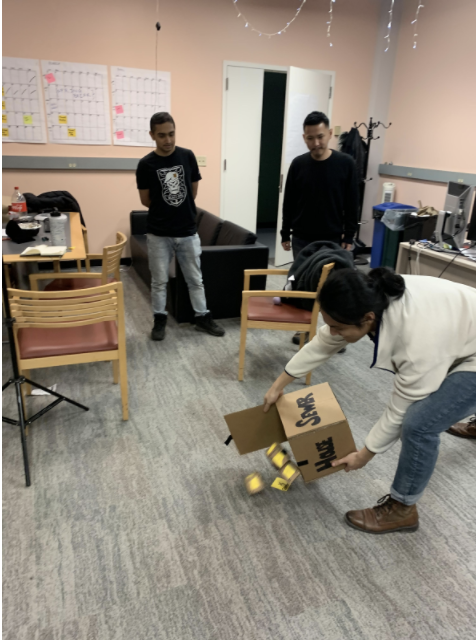CMU ETC- Game Design
Game Design was a class I took in Spring 2020 at Carnegie Mellon’s Entertainment Technology Center. It was a fun and rewarding class, where we read and wrote about game design, and designed many games of our own. Rather than having assignments for computer game development, we focused on the rules and methods of game design by designing games of all sorts: card games, dice games, athletic games, story games, and more. We learned how to design games, how to design them well, and how to see our designs to completion.
I was worried going into this class, as I have not played video games as much as my peers in my program (many live and breathe video games), and I was worried that would leave me with a lot of catching up to do. However, I soon discovered that while I do not know many video games, I can design great games, since games truly are everywhere.
Some classmates playtesting for me
Fancy Hopscotch
Our first assignment was to revamp the classic children’s game: hopscotch. I decided I wanted to add a little bit of whimsy to the game by creating “Fancy Hopscotch”. I created “fancy” rules on top of the hopscotch rules such as “Everyone needs to be dressed fancy and speak with a fancy accent.” Players must hopscotch while holding a shrimp cocktail, and use a shrimp as a placeholder (we used props for playtesting). The following rules added a level of fun and whimsy:
Before picking up the shrimp marker, the other players pose the question “Hey there mister argyle, what are you doing with that shrimp?” to the original player who must respond “why I am taking this #{number of square} shrimp to..” and come up with a satisfactory answer. If they hesitate or falter, or the rest of the players deem the response unsatisfactory, that player has lost their turn.
Once a player wins their turn, they are allowed to create one rule that everyone must abide to for the rest of the game. The rule can be anything, but must be agreed by all other players that it is ‘gentlemanly’
Next player will go ahead to the next number (if the previous player completed 1, they will do 2)
The cycle continues until there is a winner, then they become the one true ‘Mister Argyle’
Playtesting my dice game
Dice Canyon: MASH Style
For this assignment, we had to create a dice game. I wanted to play off of the idea of what a die was, so I decided to create a set of my own, nesting dice. These prototypes were made out of cardboard, with “action cards” in the very last set of cardboard die.
I then added in the classic childhood game of MASH, the game that predicts the future. It stands for “Mansion, apartment, shack, and house” the options for the dwelling category. That category was the big die, with more categories on the medium cardboard die, nested inside the big die. If the medium sized die landed on a sticky note side, the person would roll an even or odd to get that sticky note. If it did not land on a sticky note side, they pull an action card from within the dice, where they can steal or lose their own stickies. Once the game is over, all the players get to determine who the ‘loser’ is based on everyone’s fortune, and then the loser has to fulfill the embarrassing punishment decided from the beginning.
A skill sheet for my RPG involving pop stars turned spies
RPG: Pop stars save the grammys
This assignment, we were tasked with creating a tabletop RPG game to play with three classmates. Having never played an RPG tabletop game before, I was a little stuck on where to begin. I had a vague idea of wanting to make my players pop stars who were secretly spies (like the childrens cartoon Totally Spies! which I had happened to be watching).
As every famous girl trio in pop culture proves, there are really only three archetypes for my group. There is the “leader/brain”, the “edgy one” and the “flirt”. The skills in the roleplaying sheet would work well with these roles. The pop star by day/ spy by night dynamic created boundaries my players would need to work in. In order to be a successful pop star, they can’t get hurt on a mission, but to be a successful spy they would need to maintain their celebrity to get access to important information. The handling of potential scandals could add or subtract social points (instead of health points).
I decided a good ‘end goal’ would be that the girls giving a performance at the Grammys. I toyed with the idea of them being spies and having special skills/tools/access, but I decided I would rather them be normal pop stars. Plus it would add a fun story beat when the players, who thought their only goal was to have a successful performance, would realize they also need to figure out how to get the entire show from being blown up. (Miss Congeniality was a big inspiration)
In the end, I discovered I was so attached to the story I created that there were moments when my players would offer up an interesting direction to go, and instead of following that path, I would keep everyone on the significantly less interesting path we were already on.
If I could do the assignment again (or if I ever create a rpg tabletop game again) I would prepare less. Yes I said it! I would do less work for this assignment. I would trust myself and the improv skills I have to facilitate an adventure that everyone would be able to have a part in creating. Basically I would make the skill sheets, a two sentence logline, and start the adventure from there.



